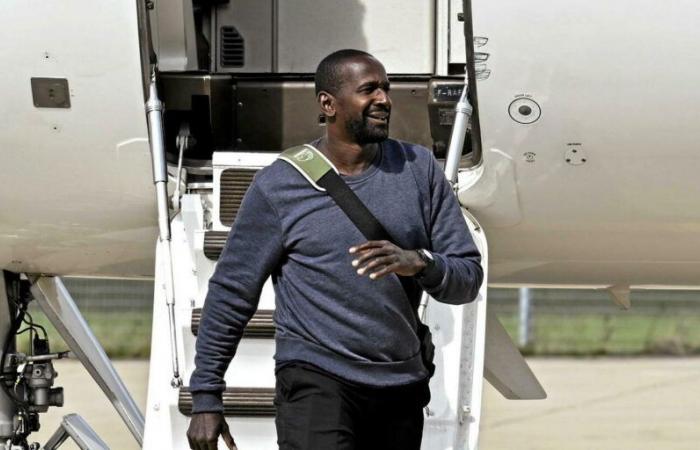« JI am a journalist. » Olivier Dubois repeated this sentence to his jailers each time they accused him of being a French spy. When reading his book Prisoner of the desert – 711 days in the hands of Al-Qaeda (released on January 30 by Michel Lafon), it appears that no sentence better sums up who he is. A journalist, he never stopped being one. From the day of his kidnapping by Jnim, a group affiliated with Al-Qaeda, on April 8, 2021 in the Gao region, in Mali, to that of his release, almost two years later, the correspondent of Point and of Liberation in the Sahel continued to do its job. He managed to secretly take notes and keep them throughout his detention. Gathered in this book, they reveal how he was lugged to ever more remote places in the Malian desert.
Escape attempt, muscular interrogations, nights of doubt among scorpions… Under his alert pen – that the readers of Point will find with pleasure – the story reads like a long and fascinating report. As a bonus, Olivier Dubois manages to get what he came for on the day of his kidnapping: an interview with a senior Jnim official! A hostage interviewing the leader of his captors… Olivier Dubois never ceases to surprise us. Back in France, he is already dreaming of new reports. “My captivity has not at all altered my love for this profession,” he confides. Journalist to the end.
The Point: The circumstances of your kidnapping in Gao, in northern Mali, are still unclear. Do you know more today?
Olivier Dubois: I have no proof, but the only scenario that emerges is this: my fixer lured me into a trap for a sum of money.
Jnim, affiliated with Al-Qaeda, kidnaps you in a region where Daesh also operates. Was it a “luck” to escape the Islamic State?
That was my big fear. If I had been captured by ISIS, I would not be here today. We know how they operate: ultra-violent, ultra-bloody and filmed executions. The Jnim kidnaps to obtain ransoms.
Once the fear has passed, your journalistic reflexes come back very quickly…
I tell it in my book: at the beginning, terror dominates. Then I have a start. I imagine that I am reporting, to try to keep my footing and not to sink. I start writing notes. It helps me take the days one after the other. After a while, two questions arise in my mind: “Will I come out alive?” If so, how do I keep my notes? »
And you succeed!
Yes. I thought I lost these notes several times, but they survived. They were flooded during the rainy season, they remained hidden for days in bags, they were discovered by mujahideen, to whom I told them that they were cooking recipes so that they would return them to me. They always stayed with me.
One of your jailers was the man who killed two RFI journalists in November 2013 in Mali, Ghislaine Dupont and Claude Verlon. What have you learned about this tragic event?
I have been searching for this question for 700 days. Every time I question my captors, the answers are generally the same. There is talk of a rapid French intervention to try to foil the kidnapping of Ghislaine Dupont and Claude Verlon. Some talk about helicopters, others about Mirages, we don’t know exactly. The fact remains that the kidnappers’ escape is interrupted and they then execute their hostages. This version is validated by the interview I did with Sedane Ag Hita, number two of Jnim.
How do you manage to get an interview with the leader of the jihadists when he is holding you hostage?
Initially, I wanted to speak to the emir of Al-Qaeda in the Sahel, Iyad Ag Ghali, because I took my kidnapping as a betrayal. I was kidnapped even though I had an invitation letter for an interview. I thought everything was covered and I found myself taken hostage. I tell myself that maybe this katiba [un groupe de combattants, NDLR] took me away by mistake. On the fourth day of detention, I wrote a letter to their leader requesting an interview. I ended up getting an interview with number two, Sedane Ag Hita. He told me that the invitation I received for my first interview request did not come from them. But when I ask them why they kidnapped me and took me to Gao, there is embarrassment. They claim to have learned who I am by listening to the radio.
You even ask him for a photo, to illustrate the interview. Did you get it?
I wanted proof to authenticate the interview. It’s a journalistic reflex. The photos were on the SD card they sent me.
What was the hardest part during your captivity?
-Time. During captivity, everything takes a very long time and it revolts me. I felt like my captors were stealing my time. The other difficult aspect is the unknown. We often imagine that the scariest thing is the men holding guns and threatening you. But you get used to it. You get used to gunshots. On the other hand, being confronted with the unknown, not knowing what will happen tomorrow, in an hour, in a minute, is very scary. Everything can stop in an instant. All it takes is a radio message, an altercation… it can turn upside down very quickly.
Two years is a very long time, but strangely, in my case, I can say that it was quick.
Among your jailers, some are more open than others. How do you describe the relationship that is developing between you?
Overall, things always went better with the officers, who were older and some of whom spoke French. I particularly think of Sidi Mohamed, who must have been a zone leader and who treated me respectfully. With the young people, who looked after me most of the time, it was more difficult.
You meet other hostages during your detention. Did Jnim specialize in kidnappings to finance itself?
This is a practice that they have controlled for several decades. You feel it when you’re there: everything is in order, whether it’s the logistics chain, the guards… I went through many places where other hostages were held, like Sophie Pétronin. There are areas designated for this, places where no one goes to look for them.
Was the mobilization of the French authorities up to par?
I don’t know everything that was implemented. Two years is a very long time, but strangely, in my case, I can say that it was quick. I saw myself being released after five to six years or not making it out at all… When I hear an audio saying “in fourteen days, you’ll get out”, I don’t believe it. It’s unexpected.
It has become very dangerous to work in the Sahel. Should European and French journalists continue to go there?
This is a serious problem for the press: the conflict zones are now so extensive… Certain parts of the Sahel have become too dangerous, especially for Westerners, who are perceived, it is unfortunate to say, as millions of dollars on legs. It was complicated to go there at the time, it’s even more so today.
Will you continue to report?
To Discover
Kangaroo of the day
Answer
For me, it’s obvious, there is a before and an after. I am not going to return tomorrow with my notebook and my pen to northern Mali. But my captivity has not at all altered my love for this profession. I love reporting, I want to continue doing my job and training young journalists.
“Prisoner of the desert – 711 days in the hands of Al-Qaeda”, by Olivier Dubois. To be published on January 30, 2025 by Michel Lafon editions.






